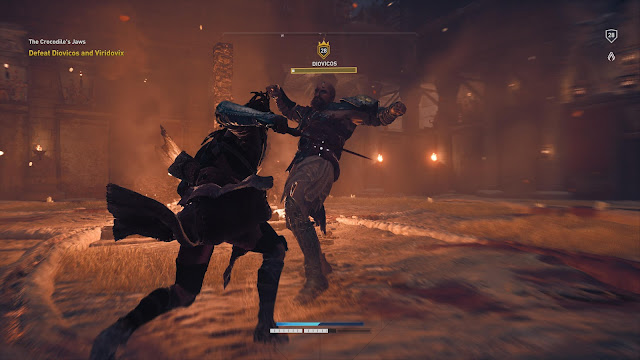MASSIVE TO A FAULT
The commercial failure of Assassin’s Creed: Syndicate prompted Ubisoft to let the franchise simmer for a year. When it returned in 2017 with Assassin’s Creed: Origins, it did so both wiser and greedier—and with a design shift that felt like a slap in the face to players who had grown fond of the tight, urban playgrounds of the two previous entries.
Set in Egypt in 49 BC, Origins presents a single, vast open world of staggering proportions. It’s among the largest I’ve ever seen, spanning scorching deserts, lush river deltas, mountain ranges, and a handful of cities. Visually, it’s spectacular. Palm-lined streets, crocodile-infested waterways, and vibrant greenery lend the world an almost fantastical quality. Experiencing it through headphones made this the most immersive entry in the series since Assassin’s Creed IV: Black Flag.
Traversal is one of the game’s undeniable strengths. The series’ signature parkour translates well to the open world, sparing you the tedium of searching endlessly for a way around cliffs or walls. The Legend of Zelda: Breath of the Wild was widely praised for similar mechanics, but honestly, Origins deserved that recognition just as much—if not more. Climbing here is faster, smoother, and consequently more enjoyable.
Unfortunately, the illusion quickly fades once you start riding through the world. For all its beauty, there’s shockingly little of interest to do. Every settlement offers the same services. NPCs recycle a handful of character models. Most points of interest turn out to be identical enemy encampments. Side characters are so forgettable that their quests blur together, reduced to icons on a map. Unless you can extract enjoyment from the game’s thin systemic design, the world becomes little more than a gorgeous backdrop.
Still, played a certain way—and that “right way” will vary by player—Origins can be engaging. You play as Bayek, a medjay sworn to protect his homeland of Siwa. After being kidnapped alongside his son by masked men, Bayek accidentally kills the boy while trying to escape. Joined by his wife Aya, he embarks on a revenge-driven journey across Egypt, hunting down those responsible.
Bayek, fittingly for a proto-assassin, lacks the refined tools of his successors. He has fire bombs, poison and sleep darts, smoke screens, and a berserk-inducing needle—but swapping between them requires menu navigation, which makes stealth cumbersome. His eagle companion, Senu, is far more interesting. Poorly explained but essential, she allows you to scout areas, tag enemies and objectives, spot alarms, and even identify caged animals you can release to sow chaos. With upgrades, she can even stun enemies directly.
Combat, however, is where Bayek truly shines. Origins embraces full RPG mechanics, with three skill trees dedicated to melee combat, ranged combat, and tools. Light and heavy attacks, dodges, shield blocks, and parries form the backbone, with combat loosely inspired by Dark Souls—albeit far more forgiving. The system works surprisingly well, offering satisfying feedback and a decent range of animations.
Weapon variety is strong. Dual blades are quick, maces hit like trucks, spears offer excellent reach, and sickle swords cause bleeding. Bows, finally, are genuinely useful, functioning like different firearm archetypes—snipers, shotguns, assault rifles—each with their own ammo.
Then there’s the rot at the core: microtransactions. For real money, you can buy in-game currency, crafting materials, ability points, and even maps to rare locations. Normally I’d shrug this off, but here it actively poisons the experience. Progression is so slow and grind-heavy that the temptation to spend money feels deliberate. I spent entire sessions grinding just to meet level requirements for the next main quest. It was dull, repetitive, and demoralizing—and it only worsens as the game goes on.
Every enemy camp plays out the same. Hunting animals for crafting materials is tedious rather than rewarding. Blacksmith upgrades cost absurd amounts of money. And why does upgrading armor require wiping out entire species? By the time you fully upgrade a chest piece, Egypt’s gazelle and crocodile populations should be extinct.
Thankfully, the main story redeems much of this. After a weak opening, the assassination targets become more creative, with some genuinely inventive sequences. One standout has Bayek awakening in the desert, buried up to his neck in sand after being drugged—forcing you to figure out your escape with limited options. Moments like these showcase the game at its best.
Several historical characters and unique scenarios elevate the latter half of the story. Bayek and Aya are well-written and charismatic, though the game’s M-rating often feels cosmetic, fading to black just as things get intimate. Still, the narrative momentum and character work carried me through the worst of the grind.
In the end, Assassin’s Creed: Origins is a game of trade-offs. You gain a stunning world, compelling leads, and a solid combat system—particularly the ranged combat and Senu’s scouting mechanics. Exploring the pyramids and discovering the hidden depths of the Sphinx genuinely thrilled me.
But the cost is enormous. The bloat is relentless. Enemy variety is limited, combat grows repetitive, and even major assassinations are often trivialized by easy vantage points and escape routes. The game simply cannot justify its scale. I finished it with vast regions left unexplored, and no desire to return.
Assassin’s Creed: Origins is a good game buried beneath a desert of nonsense.










Comments
Post a Comment